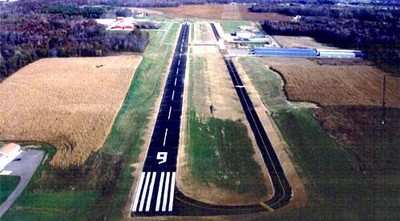Slight Change In Wording Could Cause Major Changes In Airport
Access
The FAA's new Airport Compliance Manual adversely affects every
federally funded airport by telling local airports how to deal with
their neighbors, according to the advocacy group "Through The
Fence". The new policy would appear to forbid local airport
authorities from entering into new "through-the-fence" agreements
with surrounding land owners, and requires non-renewal of current
agreements at the end of their contract term. The rule, which
replaces the word "discourage" with "prohibit", affects thousands
of businesses, pilots, aircraft hangars, and hangar homes connected
by gated taxiways to airport property.

Brent Blue, the creator of www.throughthefence.org,
told ANN the FAA, in responding this week to two Freedom of
Information Act requests, could not provide any data to support new
prohibitions on "through-the-fence" (TTF) agreements. The new
prohibitions were announced in the Airport Compliance Manual
5190.6B unveiled September 30, 2009, which was prepared without any
public input or comment.
A "though-the-fence" agreement permits the owner of private land
next to an airport to have taxiway access to the runway via a
gate. The owner of the land, which may include a
business, hangar, or hangar home, pays the airport a TTF fee for
this access and uses on airport services such as fuel and
maintenance. The agreements provide significant income to the
airport authority and loss of this funding threatens the economic
viability of some airports.
Blue contends airport access generally increases the value of
the private land increasing property taxes benefiting the general
public. Hangar homes, where pilots live in adjoining residences to
aircraft hangars, provide increased security due to their presence
as interested observers of airport activity day and night.
"The new TTF prohibition rules look like FAA staffers made them
up as they went along based on their own prejudices without one
iota of supporting data" said Blue. "This is a classic
example of government gone wrong."

One of the two FOIA requests asked for any documentation of
noise complaints from owners of hangar homes, one of the reasons
FAA personnel gave for why they have prohibited TTF hangar
homes at federally funded airports. The FAA's Director of
Airport Compliance Randall Fiertz could only state "we were not
able to locate any records or files pertaining to your specific
request, and we are unaware of any other federal offices likely to
possess responsive records" in a December 16th letter to
Blue.
 The second FOIA asked for "any and
all records…that went into the formulation of FAA policy
related to "hangar homes/residences" and "through the fence"
agreements." Blue stated "the response to the second FOIA was
even more absurd. The FAA's response was public documents of
their current decisions and their attempts in the past to stifle
TTF activity, but not one shred of material which supports the
establishment of the prohibition. It is obvious they have no
supporting data for the rule change."
The second FOIA asked for "any and
all records…that went into the formulation of FAA policy
related to "hangar homes/residences" and "through the fence"
agreements." Blue stated "the response to the second FOIA was
even more absurd. The FAA's response was public documents of
their current decisions and their attempts in the past to stifle
TTF activity, but not one shred of material which supports the
establishment of the prohibition. It is obvious they have no
supporting data for the rule change."
Although the FAA does not have any specific jurisdiction over
airports, the Agency does have the power to withhold Airport
Improvement Grant money, and can request re-payment of those grants
if an airport is found not to be in compliance. The FAA's
policy does not allow for airport authorities to decide for
themselves what the best relationship with surrounding private
properties and property owners should be. According to Betsy
Johnson, an Oregon State Senator and former Manager of Oregon
Aeronautics Division, the FAA's new TTF prohibition is "bad for
airports, bad for the economy, and bad for the future of
aviation."
 ANN's Daily Aero-Term (12.13.25): Light Gun
ANN's Daily Aero-Term (12.13.25): Light Gun Aero-News: Quote of the Day (12.13.25)
Aero-News: Quote of the Day (12.13.25) NTSB Final Report: Gippsland GA-8
NTSB Final Report: Gippsland GA-8 Classic Aero-TV: Historically Unique -- Marlin Horst's Exquisite Fairchild 71
Classic Aero-TV: Historically Unique -- Marlin Horst's Exquisite Fairchild 71 Airborne 12.12.25: Global 8000, Korea Pilot Honors, AV-30 Update
Airborne 12.12.25: Global 8000, Korea Pilot Honors, AV-30 Update





